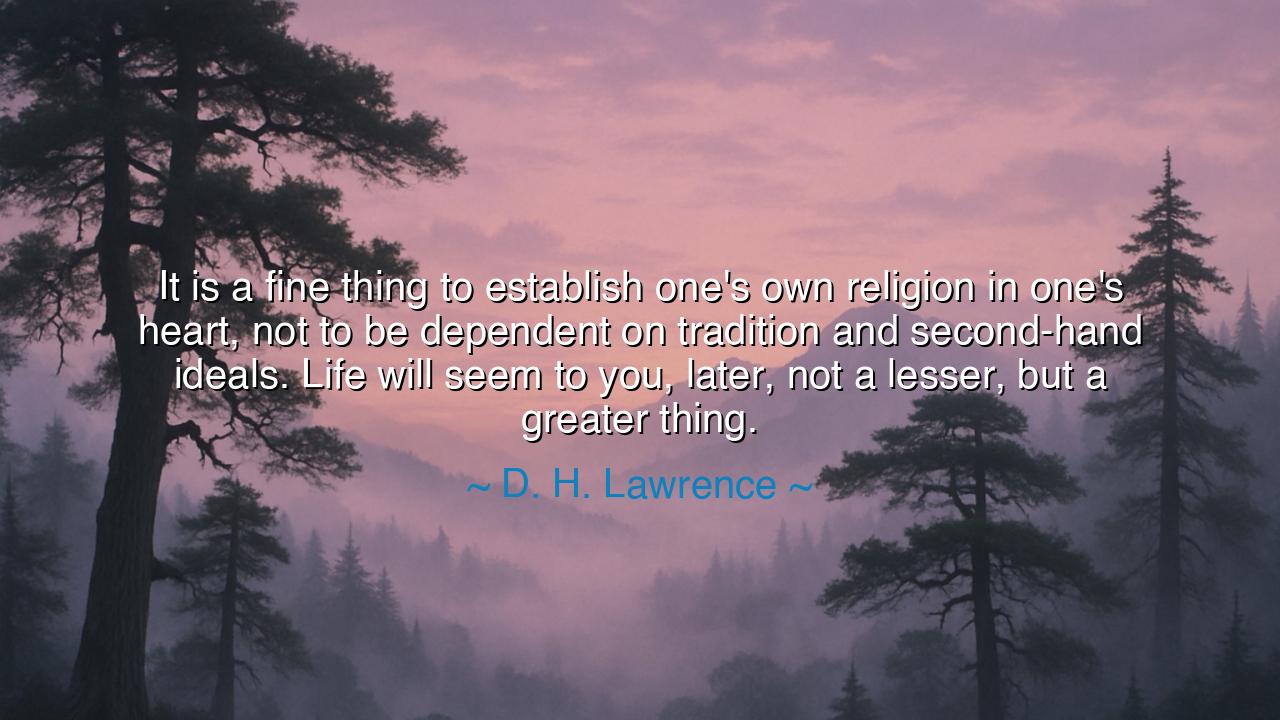
It is a fine thing to establish one's own religion in one's
It is a fine thing to establish one's own religion in one's heart, not to be dependent on tradition and second-hand ideals. Life will seem to you, later, not a lesser, but a greater thing.






In the vast expanse of human experience, where the soul seeks meaning and purpose, the words of D.H. Lawrence offer a profound and stirring invitation: "It is a fine thing to establish one's own religion in one's heart, not to be dependent on tradition and second-hand ideals. Life will seem to you, later, not a lesser, but a greater thing." These words challenge us to break free from the shackles of inherited beliefs and cultural expectations, and to create a personal, authentic path to meaning. Lawrence urges us to look beyond the doctrines and customs passed down to us, and instead to forge a religion that is uniquely our own—a living, breathing expression of truth that is not borrowed but deeply felt and experienced within the heart.
Ancient wisdom has long spoken to the value of personal self-realization and the pursuit of inner truth. In the Hindu tradition, the Brahman, the ultimate reality, is said to be beyond the confines of ritual and external worship, and the individual must seek to experience the divine within themselves. The great yogis and mystics of ancient India, such as Ramakrishna and Vivekananda, taught that the true religion was not merely the adherence to external rites, but the direct experience of divinity in one's own heart. Similarly, the Stoics, such as Epictetus and Marcus Aurelius, emphasized that wisdom and virtue do not come from blindly following external rules or traditions, but from cultivating inner strength and understanding. For them, the greatest power lay in discovering and living by one’s own truth—a truth that comes from within, not from the dictates of others.
In this light, Lawrence's words are a call to self-empowerment. He urges us to recognize that true wisdom and authentic faith do not come from external sources or the approval of society, but from our own inner experiences and discoveries. Consider the life of Socrates, who famously declared that "the unexamined life is not worth living." Socrates was not advocating for blind adherence to tradition or the uncritical acceptance of external truths. Instead, he sought a personal, inward understanding of life that was grounded in self-examination and reflection. By examining his own life and questioning everything, Socrates crafted his own moral and spiritual framework—one that was deeply personal and ultimately led him to his death, but also to immortality through his ideas. In this way, Socrates embodies the spirit of Lawrence’s call to create a personal, deeply rooted sense of faith and meaning.
In the modern world, Ralph Waldo Emerson provides another example of this idea. Emerson, a central figure in the Transcendentalist movement, rejected the conformity of traditional religious institutions and instead urged individuals to seek divinity in nature and within themselves. He wrote, "Trust thyself: every heart vibrates to that iron string." Emerson believed that the truth each person seeks is not found in the dogma of the past, but in the experience of life itself—the feelings, the senses, and the profound connection to nature. Like Lawrence, Emerson championed the individual journey to find meaning, suggesting that only when we move away from second-hand ideals—those borrowed from others—can we truly live a great and meaningful life.
The lesson of Lawrence’s words is both simple and profound: life becomes infinitely greater when we embrace our own journey toward meaning and truth, free from the constraints of external expectations. To live in a way that is true to ourselves is to embrace the full potential of human existence, unfettered by the weight of tradition or the shadows of inherited beliefs. When we create our own inner compass, based on our values, experiences, and insights, we allow ourselves the freedom to live with purpose and passion. Life, once confined to the narrow paths laid out by others, becomes expansive, and the possibilities for growth, discovery, and joy multiply.
In our own lives, we must take this lesson to heart. Establishing our own religion in our hearts does not mean rejecting all that has come before, but rather transforming it into something deeply personal and meaningful. It requires self-examination, reflection, and the courage to live in alignment with our deepest truths. Whether in our work, our relationships, or our spiritual practices, we must ask ourselves: Is this path mine? Is this truth my truth? Tradition and societal expectations are not inherently bad, but we must not allow them to shape our lives if they are not aligned with our inner vision of what is right, what is good, and what is true.
Thus, let us embrace Lawrence's call to live boldly and authentically, to shape our own paths, and to create a life that is not lesser but greater for having been shaped by our own hand. The power to live a full and meaningful life lies within us all, in the choices we make, the beliefs we choose to uphold, and the courage we show in defining our own existence. By stepping away from the shadows of others’ truths, we step into the light of our own, where life becomes not merely a series of expectations, but a living, breathing reflection of our highest potential.






AAdministratorAdministrator
Welcome, honored guests. Please leave a comment, we will respond soon